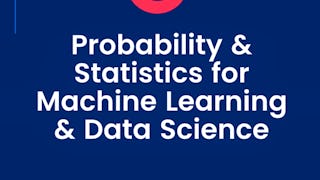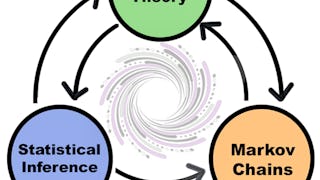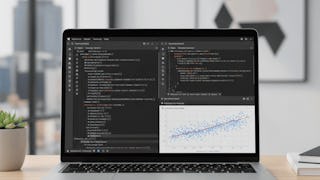Filter by
SubjectRequired
LanguageRequired
The language used throughout the course, in both instruction and assessments.
Learning ProductRequired
LevelRequired
DurationRequired
SkillsRequired
SubtitlesRequired
EducatorRequired
Explore the Probability Distribution Course Catalog
 Status: Preview
Status: PreviewUniversity of Zurich
Skills you'll gain: Probability, Probability Distribution, Probability & Statistics, Statistics, Descriptive Statistics, Applied Mathematics, Risk Analysis, Finance
 Status: Free Trial
Status: Free TrialUniversity of Colorado Boulder
Skills you'll gain: Probability, Probability & Statistics, Probability Distribution, Bayesian Statistics, Statistical Methods, Data Analysis, Statistical Inference, Statistical Analysis, Artificial Intelligence
 Status: Free Trial
Status: Free TrialDeepLearning.AI
Skills you'll gain: Descriptive Statistics, Bayesian Statistics, Statistical Hypothesis Testing, Probability & Statistics, Sampling (Statistics), Probability Distribution, Probability, Statistical Inference, A/B Testing, Statistical Analysis, Statistical Machine Learning, Data Science, Exploratory Data Analysis, Statistical Visualization
 Status: NewStatus: Free Trial
Status: NewStatus: Free TrialUniversity of Colorado Boulder
Skills you'll gain: Probability, Statistical Inference, Estimation, Probability & Statistics, Probability Distribution, Statistical Methods, Statistics, Markov Model, Bayesian Statistics, Data Literacy, Statistical Analysis, Sampling (Statistics), Applied Mathematics, Artificial Intelligence, Generative AI, Data Analysis, Data Science, Theoretical Computer Science, Machine Learning Algorithms, Mathematical Theory & Analysis
 Status: Free Trial
Status: Free TrialUniversity of Colorado Boulder
Skills you'll gain: Probability, Statistical Hypothesis Testing, Statistical Inference, Probability & Statistics, Probability Distribution, Statistical Methods, Statistics, Bayesian Statistics, Data Literacy, Sampling (Statistics), Applied Mathematics, Data Ethics, Data Analysis, Statistical Analysis, Quantitative Research, Data Science, Theoretical Computer Science, Sample Size Determination, Artificial Intelligence
 Status: NewStatus: Free Trial
Status: NewStatus: Free TrialSkills you'll gain: Sampling (Statistics), Matplotlib, Data Analysis, Data Mining, Statistical Analysis, Statistical Hypothesis Testing, NumPy, Pandas (Python Package), Probability Distribution, Dimensionality Reduction, R Programming, Probability, Python Programming, Scikit Learn (Machine Learning Library), Linear Algebra, Applied Machine Learning, Unsupervised Learning, Regression Analysis, Statistical Methods, Artificial Intelligence and Machine Learning (AI/ML)
What brings you to Coursera today?
 Status: Free Trial
Status: Free TrialRice University
Skills you'll gain: Statistical Hypothesis Testing, Microsoft Excel, Pivot Tables And Charts, Regression Analysis, Statistics, Descriptive Statistics, Probability & Statistics, Graphing, Spreadsheet Software, Probability Distribution, Business Analytics, Statistical Analysis, Statistical Modeling, Statistical Inference, Excel Formulas, Data Analysis, Data Presentation, Business Analysis, Statistical Methods, Sample Size Determination
 Status: Free Trial
Status: Free TrialJohns Hopkins University
Skills you'll gain: R Programming, Statistical Analysis, Combinatorics, Data Analysis, Probability, Statistics, Probability Distribution, Probability & Statistics, Bayesian Statistics, Applied Mathematics, Data Science, Artificial Intelligence and Machine Learning (AI/ML), Simulations
 Status: NewStatus: Free Trial
Status: NewStatus: Free TrialJohns Hopkins University
Skills you'll gain: Algebra, Graphing, Applied Mathematics, Mathematical Modeling, Trigonometry, Probability, Advanced Mathematics, Data Analysis, Logical Reasoning, General Mathematics, Probability Distribution, Mathematical Theory & Analysis, Descriptive Statistics, Arithmetic, Statistics, Engineering Calculations, Calculus, Visualization (Computer Graphics), Geometry, Analytical Skills
 Status: NewStatus: Free Trial
Status: NewStatus: Free TrialSkills you'll gain: Natural Language Processing, Deep Learning, Large Language Modeling, Text Mining, Semantic Web, Generative AI, PyTorch (Machine Learning Library), Artificial Neural Networks, Python Programming, Cryptography, Generative Model Architectures, Applied Machine Learning, Machine Learning Methods, Unsupervised Learning, Probability Distribution, Machine Learning Algorithms, Algorithms
 Status: NewStatus: Preview
Status: NewStatus: PreviewO.P. Jindal Global University
Skills you'll gain: Sampling (Statistics), Statistical Analysis, Probability Distribution, Statistical Hypothesis Testing, Descriptive Statistics, Statistical Methods, Correlation Analysis, Regression Analysis, R (Software), R Programming, Statistical Modeling, Statistical Inference, Probability, Big Data, Decision Tree Learning
 Status: Free Trial
Status: Free TrialKennesaw State University
Skills you'll gain: Six Sigma Methodology, Lean Six Sigma, Root Cause Analysis, Lean Methodologies, Process Improvement, Data Collection, Quality Improvement, Process Optimization, Correlation Analysis, Statistical Hypothesis Testing, Kaizen Methodology, Process Analysis, Probability Distribution, Regression Analysis, Process Capability, Business Process, Statistical Process Controls, Quality Management, Team Management, Project Management
Probability Distribution learners also search
In summary, here are 10 of our most popular probability distribution courses
- An Intuitive Introduction to Probability: University of Zurich
- Probability Foundations for Data Science and AI: University of Colorado Boulder
- Probability & Statistics for Machine Learning & Data Science: DeepLearning.AI
- Foundations of Probability and Statistics: University of Colorado Boulder
- Data Science Foundations: Statistical Inference: University of Colorado Boulder
- AI Machine Learning with R & Python Projects: EDUCBA
- Business Statistics and Analysis: Rice University
- Foundations of Probability and Random Variables: Johns Hopkins University
- Honors Algebra 2: Johns Hopkins University
- Modern Natural Language Processing: Packt










